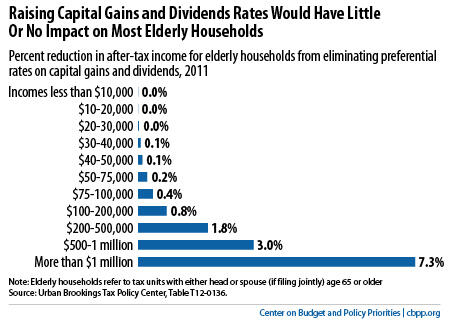off the charts
POLICY INSIGHT
BEYOND THE NUMBERS
BEYOND THE NUMBERS
Scaring Seniors on Capital Gains
Receive the latest news and reports from the Center
“Seniors . . . will be hurt the most” if policymakers let the tax rates on capital gains and dividends rise next year as scheduled, a Wall Street Journal op-ed today argues. This is simply false. The data clearly show that raising the rates would have little or no impact on most elderly households.
To be sure, elderly households are more likely to have some capital gains or dividend income than younger households. But most elderly households have very little of it: 79 percent of elderly filers have incomes under $75,000, but they receive just 5.5 percent of all capital gains and dividend income, according to the Urban-Brookings Tax Policy Center.
Thus, most elderly households benefit little from the tax rates for capital gains and dividends, which are well below those for wages and salaries.
Capital gains and dividends rates will still be below those for wages and salaries even if the scheduled rate increases take effect next year. But suppose we went further and eliminated the preferential rates for both capital gains and dividends. Elderly filers with incomes below $40,000 — that’s nearly 60 percent of all elderly households — would see their incomes drop by less than one-tenth of 1 percent, on average (see graph). In dollar terms, that’s less than $6.

President Obama has proposed allowing the capital gains and dividend rates to rise to Clinton-era levels only for upper-income households (those with incomes above $250,000 for a married couple). This would affect only a tiny share of elderly households: 96 percent of elderly households had incomes below $200,000 in 2011.
Seniors do have an important stake in the question of what the capital gains and dividend rates should be, but it’s not the one that the op-ed describes. Continuing the current low rates, which basically amount to a lucrative tax cut for the nation’s wealthiest people, would create added pressure for cuts in Medicare and Medicaid — two critical programs for millions of elderly Americans — as part of efforts to reduce budget deficits.